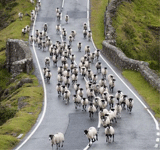| Global Warming Compromises Chilean Grape | |||||||||||
|
|||||||||||
//english.dbw.cn 2015-11-30 10:17:47 |
|||||||||||
 File photo of a vineyard in Chile. [Photo: douban.com] Climate change is said to be affecting Chilean winemakers' efforts to improve their image abroad from bang-for-your-buck vinos to more premium wines. Nestled between the Pacific Ocean to the west and the Andes mountain range on the east, Chile's producers have traditionally thrived in this Mediterranean-like climate. But with temperatures rising and rains becoming scarcer, producers are being forced to employ new techniques, or even uproot vineyards and move to cooler, wetter climates further south before grape quality suffers. Julio Bastias is the chief enologist at Matte Vineyards, located in central Chile. "What we have observed over time is that the temperatures or the seasons start to change, there is an increase in temperatures, the thermal fluctuation diminishes and this means that we don't know for how many more years or how many more decades we will be able to cultivate some varieties, like some whites or some reds that will probably have to stop growing here to let other varieties grow that adjust better to these climatic changes or a new temperature in the valleys." Winemaking in Chile dates back to the arrival of the first conquistadores four and a half centuries ago. It wasn't until the early 1980s that producers like Spanish winemaker Miguel Torres introduced methods that have since lifted the industry to become the world's fourth biggest exporter, with Chilean wine now a familiar sight on supermarket shelves from China to the U.S. and Europe. Bastias says if temperatures keep rising, maintaining current grape varieties and improving quality in Chile is going to become increasingly difficult. "Basically the grapevines need heat to sprout, develop their metabolism and ripen the fruit properly. What happens when there are changes in temperatures or areas begin to have an increased or decreased temperature, is that a specific variety is going to lose its characteristics. So they are notes in the organoleptic properties of the wine are going to start to affect their quality. Chile is best known for its signature carmenere grape, an old French variety rediscovered 20 years ago after being thought extinct, but also grows cabernet sauvignon, sauvignon blanc, merlot and chardonnay, among others. Claudia Villarroel, a meteorologist at Chile's Meteorological office, explains some of the changes in weather conditions. "It has been shown that at least in the central zone, and above all in cities that are more populated or have more buildings, there has been a change of 0.2 degrees, precisely, in the maximum temperature, above all here in Santiago, and in the minimum temperature it has been around the same range." Almost 200 nations will meet in Paris this month to try to work out a global accord to slow climate change. But, according to climate change data from the World Bank, an increase in temperature of at least 1.5 degrees Celsius is more or less locked in. Chile's wine production has doubled in the last 15 years and exports are forecast to reach 3 billion dollars by 2020, up from 1.8 billion dollars currently.
|
|||||||||||
| Author: Source:qq.com Editor:Yang Fan |
|||||||||||
 中文简体
中文简体










